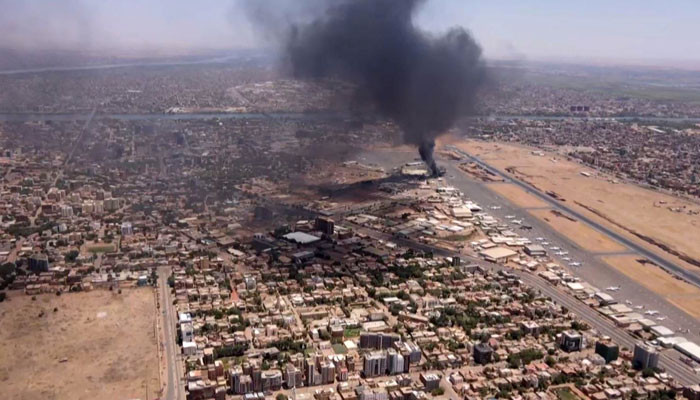- Analysts fear regional disorder.
- Conflict claims over 400 lives.
- Clashes resume after brief pause.
The struggle for primacy in Sudan entered the second day of Eid as the temporary ceasefire broke after some time it was announced by the warring forces of Army Chief Abdel Fattah-Al-Burhan and his rival Rapid Support Forces (RSF) chief Mohamed Hamdan Daglo.
The conflict has claimed the lives of 413 people, leaving thousands injured and a thousand of others confined to their homes without electricity, water and communication.
The massive gunfire resumed on Saturday morning after the loud overnight explosions, reported AFP.
The clashes broke out on April 15 between Sudan’s army loyal to Burhan and paramilitary RSF forces under the command of Daglo. Both sides have been accusing each other of attacking the first.
Both parties were allied earlier when they staged a coup against President Omar al-Bashir ending his rule 2021 that started in 1993.
In an announcement on Friday, the army said it had agreed to a ceasefire for three days for the Eid ul Fitr holiday — at the conclusion of the Muslim Holy month of Ramadan.
A day earlier, UN Secretary-General Antonio Guterres and US Secretary of State Antony Blinken had also called for a ceasefire citing the end of the holy month.
Daglo, in a statement, said that he had “discussed the current crisis” with Guterres, and was “focused on the humanitarian truce, safe passages and protecting humanitarian workers”.
Earlier in the week, two 24-hour ceasefire calls were also ignored.
Both the thousand-stong RSF and the army are locked in an inexorable competition of strength with neither side apparently seeming to gain an upper hand.
People stuck in homes
The warring parties have forced millions of people in the capital Khartoum to confine to their homes in hot weather without electricity and water. Some of them only secured basic food supplies with some others fleeing the city.
A resident, Sami al-Nour, told AFP that “Eid is meant to be spent with sweets and pastries, with happy children, and people greeting relatives, instead, there has been gunfire and the stench of blood all around us”.
Khartoum has been witnessing one of the deadliest fighting, with military planes conducting strikes and tanks roaming around the streets, engulfing the country into violence.
On Friday, the army accused Daglo’s forces of assaults in the capital’s twin city of Omdurman where they released “a large number of inmates” from a prison. The paramilitary — a progeny of the Janjaweed militia group — denied the allegations.
The major cause of the bitterness between the Burhan and Daglo is the matter of RSF’s integration into the regular army. It was a key condition for a final deal seeking Sudan’s democratic transition.
RSF’s commander Daglo now maintains that the coup was a “mistake” that failed to bring about change, whereas Burhan says it was “necessary” to include more groups in politics.
Evacuation plans underway
South Korea, Japan, and the United States are planning to evacuate their citizens from the conflict-stricken Sudan Plans to the neighbouring countries with European Union (EU) also eyeing a similar move.
US State Department said Friday the situation was still too risky for an evacuation of embassy personnel.
Later, the RSF said it was ready to partially open all airports in Sudan to evacuate foreign citizens, although it could not be verified which airports they control.
Despite the World Health Organisation’s (WHO) estimation of 413 people killed, the number is assumed to be much higher with several others who could not make it to the hospitals.
According to the doctors’ union, more than two-thirds of hospitals in Khartoum and neighbouring states are now “out of service” while others have been looted, and at least four hospitals in North Kordofan state were shelled.
The World Food Programme in a warning stated that the conflict could throw millions into hunger where already 15 million people are in dire need of aid.
There is a general fear among analysts and experts that the country could also spread regional disorder by plunging into a full-blown civil war.

